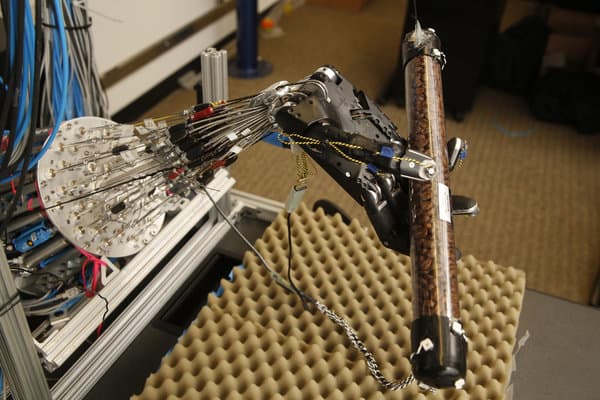New Five Fingered Robot To Provide A Much Tighter Grip
Known for their capability to learn and perform, nowadays robots are reaching a culmination point where the humanoids will be able to do everything a human does. In the last decade, we have witnessed sectors where robots have been predominantly effective such as space missions, Baby-sitting, Conveyor belt monitoring and much more. Although they might be intellectual or physically precise but in most of the cases, they lack a simple hand which can hold an object with a good grip.
Convoluted tasks require a strong grasp over a certain object and a high degree of dexterity so that it can be manipulated accurately. The University of Washington Press release confirms that, rolling, bending, pivoting, cutting could be easily done with manual labor, but for robots it become unimaginably hard to even grasp a pencil. A team from the same university has now unveiled a dexterous hand having a high number of degrees of freedom and complex Artificial Neural Network based circuitry which can not only carry out tasks concerning the complex gripping mechanism, but also learns from it by experience.
Indian origin scientist Vikash Kumar articulated that the society needs an artificial arm to be an exact replica of the human arm with minimal error. A human arm possesses 20 independent degrees-of-freedom, coupled with 30 muscles and supported by numerous proprioceptive and tactile sensors. The final integration lets us do the daily jobs without significant disturbances in the process. However, as said earlier, even the most advanced robots have a claw or a comparatively less receptive technology than a full-fledged hand.

Five-Fingered Arm Gripping An Object
The UW team has been effectively approaching towards the research objective which was to make the most powerful 5-fingered robot ever. Initially they procured a simulation model that helps a computer to track movements in real time. The current demonstration shows, the hand was directed to rotate an object and it improved adaptively, with many turns and practices.
The machine learning algorithm in combination with basic physics principles ultimately resulted in the desired system. Senior author Emo Todorov explained that they had to first feed every bit of detail required to move, just the way a human hand does. They studied various aspects and tested whether the middle finger moved enough to grip. But after incorporation, the hand self-sustained and self-improved it, learning from it's past experience.
The team built the mechanical system at a cost of $300,000 which is way too expensive to commercialize. However, the “shadow hand†with actuated with a custom pneumatic system allowed the team to push the research work to achieve the target. After certain manipulative experiments the team coalesced the simulation data with the hand which collects data from various sensors and motion capture cameras, and applies machine learning algorithm to envision concurrent methods. The complete system requires many updates in terms of economy and research before commercialization is possible. The work was funded by the National Science Foundation and the National Institutes of Health and was published in the IEEE International Conference on Robotics and Automation.
Watch ADROIT manipulation platform:
Source: <a href="https://www.washington.edu/news/2016/05/09/this-five-fingered-robot-hand-learns-to-get-a-grip-on-its-own/" target="_blank" rel="nofollow noopener noreferrer">This five-fingered robot hand learns to get a grip on its own | UW News</a> | <a href="https://www.icra2016.org/" target="_blank" rel="nofollow noopener noreferrer">ICRA 2016 in Stockholm – IEEE International Conference on Robotics and Automation</a>
Convoluted tasks require a strong grasp over a certain object and a high degree of dexterity so that it can be manipulated accurately. The University of Washington Press release confirms that, rolling, bending, pivoting, cutting could be easily done with manual labor, but for robots it become unimaginably hard to even grasp a pencil. A team from the same university has now unveiled a dexterous hand having a high number of degrees of freedom and complex Artificial Neural Network based circuitry which can not only carry out tasks concerning the complex gripping mechanism, but also learns from it by experience.
Indian origin scientist Vikash Kumar articulated that the society needs an artificial arm to be an exact replica of the human arm with minimal error. A human arm possesses 20 independent degrees-of-freedom, coupled with 30 muscles and supported by numerous proprioceptive and tactile sensors. The final integration lets us do the daily jobs without significant disturbances in the process. However, as said earlier, even the most advanced robots have a claw or a comparatively less receptive technology than a full-fledged hand.

Five-Fingered Arm Gripping An Object
The UW team has been effectively approaching towards the research objective which was to make the most powerful 5-fingered robot ever. Initially they procured a simulation model that helps a computer to track movements in real time. The current demonstration shows, the hand was directed to rotate an object and it improved adaptively, with many turns and practices.
The machine learning algorithm in combination with basic physics principles ultimately resulted in the desired system. Senior author Emo Todorov explained that they had to first feed every bit of detail required to move, just the way a human hand does. They studied various aspects and tested whether the middle finger moved enough to grip. But after incorporation, the hand self-sustained and self-improved it, learning from it's past experience.
The team built the mechanical system at a cost of $300,000 which is way too expensive to commercialize. However, the “shadow hand†with actuated with a custom pneumatic system allowed the team to push the research work to achieve the target. After certain manipulative experiments the team coalesced the simulation data with the hand which collects data from various sensors and motion capture cameras, and applies machine learning algorithm to envision concurrent methods. The complete system requires many updates in terms of economy and research before commercialization is possible. The work was funded by the National Science Foundation and the National Institutes of Health and was published in the IEEE International Conference on Robotics and Automation.
Watch ADROIT manipulation platform:
0
